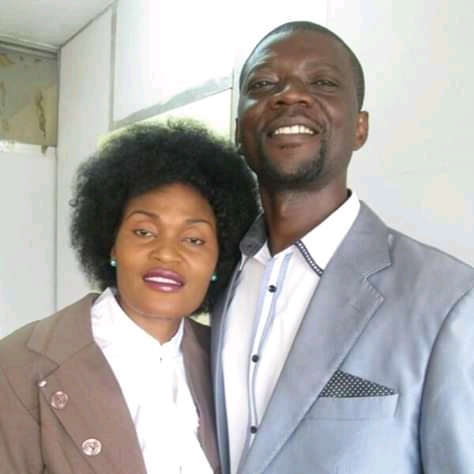Zambian students magnify Caritas Zambia 2022 Equality Walk for Justice
Notice: Undefined index: catFilterList in /home/zambi/public_html/wp-content/plugins/wp-likes/api.php on line 243
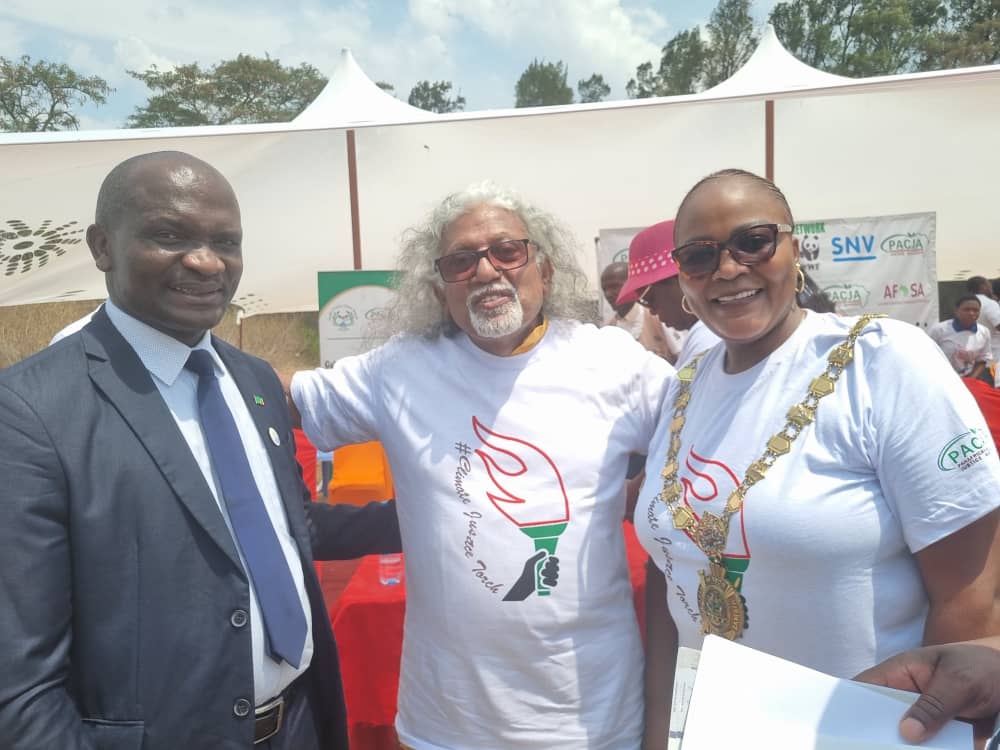
Lusaka Mayor, Chilando Chitangala (Right), Chair of the African Group of Negotiators (AGN) on climate change, Mr. Ephraim Mwepya Shitima of Zambia (Left), a Ministry of Green Economy and Environment Director, and global environmental activist Pushpanath Krishnamurthy (Center) as Lusaka’s Mulungushi International Conference Center (MICC) on Saturday 22nd October, 2022
By Francis Maingaila in Lusaka, Zambia
SCORES of students from various higher learning institutions within Lusaka joined a Caritas Zambia organised ‘Solidarity Walk’ from Levy Junction to Showgrounds.
The enthusiastic students led by Lusaka Mayor, Chilando Chitangala, Chair of the African Group of Negotiators (AGN) on climate change, Mr. Ephraim Mwepya Shitima of Zambia, a Ministry of Green Economy and Environment Director, World Wide Fund for Nature Zambia Country Office (WWF-ZCO) Coordinator Bernard Nachilala Nkombo and global environmental activist Pushpanath Krishnamurthy, initially took Church Road, and joined Addis Ababa Avenue before turning into Nangwenya Road and entered through the Southern gate into the Show Grounds chatting and singing, and found Mwiza Zulu, Wezi and Bflow ready to sing uplighting liberty music.
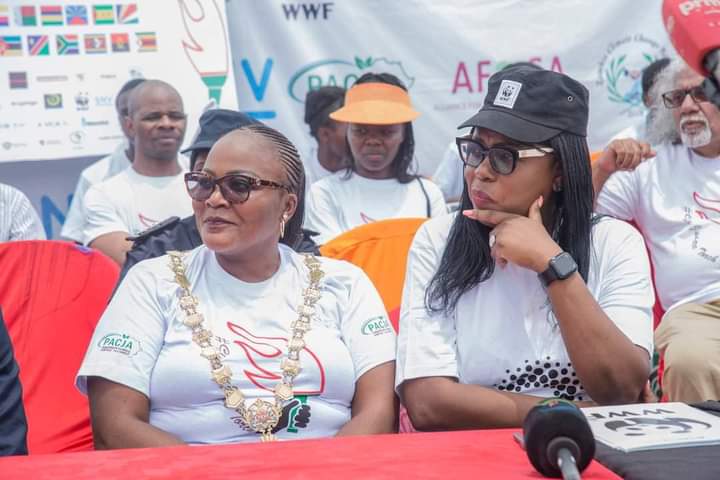
Lusaka Mayor, Chilando Chitangala (Left), on climate change, World Wide Fund for Nature Zambia Country Office (WWF-ZCO) Coordinator Bernard Nachilala Nkombo (Center) and global environmental activist Pushpanath Krishnamurthy (Right)
Diakonia Zambia representative Amos Lumba told students that justice and equality should be the song for all the people not only in Zambia but across the world.

Mr. Lumpa who said his organisation is working with partners to promote not only equality, transparency and accountability but also demanding for change in the way the people look at each other and reduction of inequality, demanding accountability demanded justice to to the officer bearers
Lumpa said it is the duty of office bearers to ensure that rights of citizens wherever they are respected.
Lumpa said the people wherever they are deserve the best and the government should endeavor to provide for those that lack the means of survival in any society.
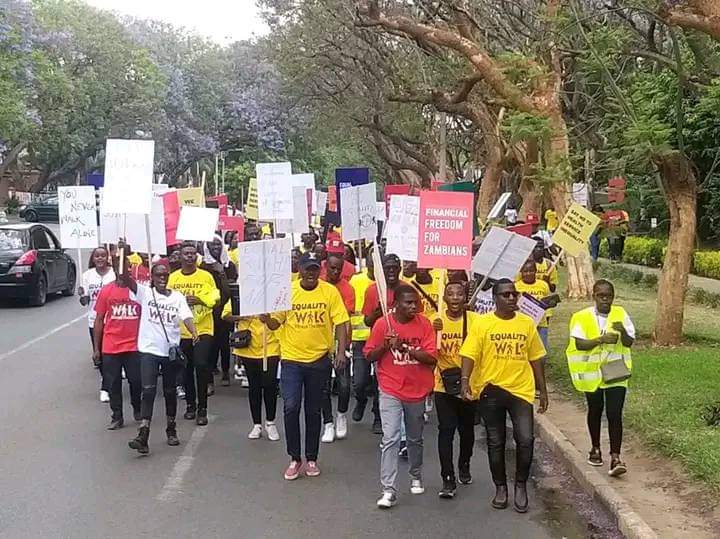
Lumpa said his organisation will continue to fight not only for a sustainable and just society where all the people will live as one but also against debt sustainability in Zambia.
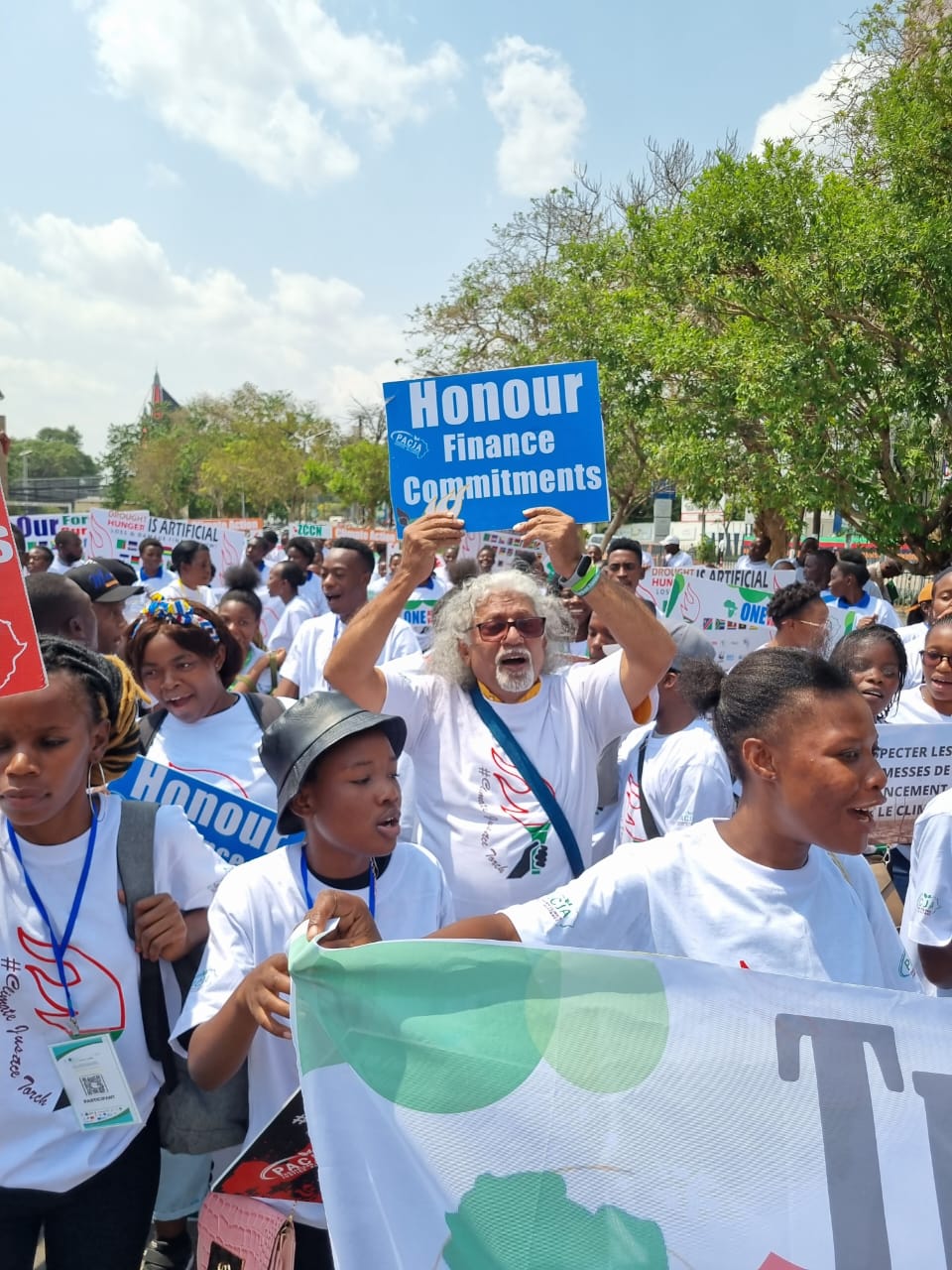
Global environmental activist Pushpanath Krishnamurthy (Center) as Lusaka’s Mulungushi International Conference Center (MICC) on Saturday 22nd October, 2022
Former Caritas Zambia director Eugene Kabilika regretted the high debt the country had accumulated in the previous years.
Due to high debts the country has now resorted to more borrowing more debts from the black markets and spent most of its earning to service accrued debt.
Out of desperation, the government could be even contemplate selling some of its assets to pay of the debts, regretted a concerned Mr. Kabilika.
Kabilika said in 2011, Zambia had graduated to a low income country and this resulted into reckless expenditure.
Before the 2021 elections Zambia defaulted twice resulting into the high inflation and the government began to fail to provide social expenditure.
Today, Zambia has new laws, which the new government is putting together to prevent reoccurring into high debts.
“It is also trying to find ways of sustaining the debts and respond to social needs. The challenge is now on the people to do their part to help the government to move away from the high debts,” noted Kabilika.
In some countries, Kabilika noted that people are picketing for the restructuring debts to enable Zambia have a breather as debt is making life difficult for her citizens.
Kabilika said working together with Civil Society Organisations (CSOs) Debt Alliance will help authorities to demand for sustainable debts which the Country is now struggling to repay.
Kabilika said the other alternative to reduce the level of poverty and debts is to advocate for the utilisation of local resources and localized food security.

Bflow Performance’picture by Blogger Ashton Kelly Bunda – The Bundas Incorporated Blog Sport
Caritas Zambia was established in 2001 to animate the work of the Catholic Commission for Justice and Peace and the Catholic Commission for Development with the mandate to foster and uphold human dignity through promotion of integral human development. The agency aims to improve outcomes for all of Zambian society, specifically targeting the poor and marginalised, through its core programme areas: organisational development, gender equality, HIV/AIDS prevention, sustainable agricultural, emergency response and preparedness, and governance and human rights.
During disasters resulting from natural hazards like droughts and floods, Caritas Zambia provides support to the affected households through relief and rehabilitation programmes, dispensing the basic necessities such as food, shelter, medicine and hygiene sanitation. Their work also aims to increase the capacity of communities in disaster preparedness and response through training in disaster risk reduction and the creation of community awareness to recognise early warnings.
Advocacy and lobbying work at the national level to raise awareness of the importance of using gains from the country’s natural resources for social development is a core part of Caritas Zambia’s work. The agency lobbies policymakers to ensure that mining for Zambia’s copper is conducted in a responsible and environmentally sustainable way, and that all Zambians stand to benefit from the use of their country’s natural resources.
Caritas Zambia’s agriculture and alternative livelihood programmes focuses on capacity building for crop dependent communities in small livestock production but also initiatives to empower community members to effectively engage in other economic activities besides farming. Additional activities also include production of cash crops, training initiatives for farmers and harvesting and sale of forest products.
Caritas Zambia provides technical support to the dioceses to address gender inequalities and the consequences HIV/AIDS. The agency has developed HIV/AIDS work place policies and action plans to improve the social well being of women and female-headed households.
Based in Lusaka, Caritas Zambia works from the National Office there and in the 10 Caritas Diocesan and parishes spread throughout the country. To carry out their mission the agency employs 100 staff and 50 volunteers.
Caritas Zambia is indebted to the global Caritas network who have supported the agency’s work for a very long period of time, even in the face of world financial challenges that have been experienced in the recent past.
Their current partners include: Caritas Norway, Caritas England and Wales-CAFOD, Caritas Netherlands-CORDAID, Catholic Relief Services USA, Caritas Canada-Development and Peace, Caritas Australia, Caritas Sweden, Caritas Ireland-Trócaire and Caritas Internationalis.
CLIMATE CHANGE
Africa’s chief climate negotiator: We must have tangible and actionable climate decisions for a successful COP27
Franck KuwonuFrom Africa Renewal:
June 2022
10 June 2022
By: Franck Kuwonu
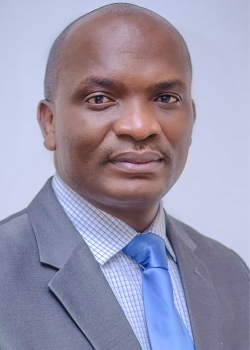
Mr. Ephraim Mwepya Shitima of Zambia (center), Chair of the African Group of Negotiators on climate change, at a recent climate change meeting in Bonn, Germany.
Mr. Ephraim Mwepya Shitima of Zambia, at center, between two other meeting participants.
Mr. Ephraim Mwepya Shitima of Zambia (center), Chair of the African Group of Negotiators on climate change, at a recent climate change meeting in Bonn, Germany.
The 27th UN Climate Change Conference of Parties (COP27) will be held in Egypt during 7-18 November 2022. Amid unmet climate commitments, lingering disruptions due to COVID-19, and the finance, energy and food challenges created by the war in Ukraine, Africa Renewal’s Franck Kuwonu, talks to the current Chair of the African Group of Negotiators (AGN) on climate change, Mr. Ephraim Mwepya Shitima of Zambia, about Africa’s priorities and what a successful COP27 would look like for the continent. These are excerpts:
What are Africa’s priorities in the lead-up to COP27 in Sharm El-Sheikh, Egypt?
For the African Group, COP27 should be about advancing implementation of the National Determined Contributions (NDCs), including adaptation and mitigation efforts and delivery of finance to enhance implementation.
COP26 concluded the remaining guidance on implementing the Paris Agreement on climate change, therefore, we need to advance the implementation of our climate actions.
For instance, we would like to see the conference reach a concrete decision on the global goal for adaptation. The latest IPCC Working group report on Impacts, Adaptation and Vulnerability, highlighted the annual cost of adaptation in developing countries from $140 billion to $300 billion by 2030. We are calling for adaptation financing to match these figures.
Portrait of Mr. Ephraim Mwepya Shitima of Zambia.
Mr. Ephraim Mwepya Shitima of Zambia, Chair of the African Group of Negotiators on climate change.
Is Africa devising a new common position on key issues or you are sticking with the one used for COP26?
After every COP, we prepare and update the African Group Position following the decisions of committee of African Heads of State and Government on Climate Change (CAHOSCC). It should be noted that some agenda items we have worked on through the years may require reiterating of African views. For example, we will continue calling for global goal for adaptation to be operationalized and guide the adaptation efforts of countries. We will also reiterate the importance of delivering the $100 billion a year by 2020 goal that was not met by developed countries.
How does the crisis in Ukraine impact Africa’s priorities?
The concern is that the Russia-Ukraine conflict is directly contributing to the exacerbation of the food price crisis, bringing to the fore the need for food supply chains resilience. The soaring food prices combined with the impacts of climate induced droughts could create an even grimmer outlook for food security in coming years.
In addition to the food crisis, the scramble by many countries to find alternative sources to energy they used to get from Russia appears to be a setback for the climate agenda as new investments are being made in fossil fuels and new supply routes being created.
Diversion of attention from climate obligations in terms of climate finance, is another area of concern. But as we go back to the negotiations, our hope is that it shouldn’t affect the outcome, as the multilateral process is guided by its rules and guidelines, irrespective of the geopolitical situation and should not make us lower our expectations.
RELATED LINKS
COP26 on climate: Top priorities for Africa
Africa must be at the heart of climate negotiations
Will it make negotiations easier or difficult this time round?
The current situation is difficult. However, the negotiations under the UNFCCC are guided by the Paris Agreement obligations, and we are committed to collectively enhancing and progressing our work under the UNFCCC. All the IPCC reports call for urgent climate action, and the Africa Group will continue to call for urgent climate action, accordingly.
What are the lessons, if any, that Africa learned from COP 26 in Glasgow that will be useful at COP27?
COPs are multilateral processes that are guided by the UNFCCC. Africa has and will continue to stress the importance of multilateral process, and COP27 will strengthen the multilateral efforts guided by the UNFCCC.
Many promises were made at COP26, including meeting the $100 billion financing gap by developed countries. How is that going?
Following the call by developing countries, the COP26 noted with regret that developed country parties have not met the $100 billion goal annually. The COP also agreed on a ‘Climate Finance Delivery Plan: Meeting the US$100 Billion Goal’ by 2025.
The African Group will continue calling on developed country parties to meet their obligation and work with other parties to ensure the swift implementation of the climate finance delivery plan.
One of the issues is that we need to agree that the $100 billion is climate finance. The danger is that our partners would want aid given to Africa and other developing countries to count as climate finance, even when it’s not related to climate.
So, we would like to drive a very clear distinction between Official Development Assistance (ODA) and climate finance.
Generally speaking, why should Africans care about climate change? How should we explain this to the ordinary person?
The reality of climate change has dawned on us for quite some years now. Particularly for our rural communities who depend on natural resources for their livelihoods.
Probably, someone in the urban centres such as Lagos, Johannesburg or Cairo may want to be academic about it because the only thing that they see is the erratic rain patterns, with no direct consequence on their daily lives, because after all, they get their water from the taps. But for rural communities across the continent who must get all their resources from mother nature, the reality is very stark.
For instance, streams or rivers which used to be their lifeline are drying up and can no longer sustain them. As a result, agricultural productivity is going down. These people can barely harvest enough crops to take them to the next season.
These are things that these people can see. The only thing that can be done is to explain to them that their traditional coping mechanisms may no longer be adequate and therefore, they need support with additional tools.
But even to those who want to be academic; the urban dwellers for example, and to those who may not pay a lot of attention to the weather patterns, you can demonstrate to them that in most of their countries, load shedding is frequently happening because not enough electricity is generated due to water levels going down. It doesn’t matter where people are, climate change affects everyone.
So, we should all care because climate change is impacting Africa’s economy as well as the development trajectory, and its adverse impacts are costing lives. The recent flooding in South Africa and its impact on people’s lives and the economy is another example.
Climate campaigners have been stressing that Africa contributes just 4 per cent of global gas emissions, yet it is highly threatened by the climate crisis. Does this argument resonate with the developed world?
It still does and we will continue pushing it. The African Group supports the need to consider this negligible contribution, and the adverse impact the continent is facing. It is important that campaigners bring to light African interests and support our agenda of sustainable development.
Africa cannot continue along the same traditional path which will simply be untenable and costly.
However, what is also true is that Africa cannot continue along the same traditional path which will simply be untenable and costly. For example, in the energy sector, we can no longer continue with the fossil fuels in the long term when the entire world is changing. We must adapt and change. In terms of our development trajectory, it must be low carbon development and one that will be sustainable.
How did the COVID-19 pandemic affect efforts to address the climate crisis in Africa?
The pandemic has had a severe impact on the health and the economy of Africa by contracting the GDP of the continent by up to 3.4%, with an estimated loss of between $173.1 billion and $236.7 billion for the years 2020–2021.
This has exacerbated the adverse impacts of climate change and reduced the capacity of African countries to adapt to climate change.
In terms of our development trajectory, it must be low carbon development and one that will be sustainable.
On the other hand, because of disruptions and the inability to meet in person, most countries were not able to update their NDCs on time.
In the larger scheme of things, however, COVID-19 has taught us the virtue of countries working together in tackling challenges. If we can apply the same model of cooperation to ensure that response to climate change is at that scale and resources quickly mobilized and made available to countries, that would be probably one of the lasting legacies from COVID-19.
What would be your idea of success for Africa at COP27?
We have a few expectations for COP27, but clear decisions on implementation of climate action will constitute success at COP27. We must have a lot of tangible, implementable outcomes. We must have decisions that people can point to and say: this is being implemented.
Topics: Climate ChangeCOP27
Facebook Twitter Pinterest Share
ALSO IN THIS ISSUE
Shallow Water Life, Mayotte Island Credit: Gaby Barathieu / Ocean Image Bank
OP-ED
Taking charge of Africa’s oceans and blue resources
Ambassadors Martin Kimani of Kenya and Ana Paula Zacarias of Portugal at UN Headquarters
CLIMATE CHANGE
UN Ocean Conference: co-hosts Kenya and Portugal call for sustainable use of oceans
Jacqueline Nantawa working at her tailoring group business in Malawi.
WOMEN’S EMPOWERMENT
In Malawi, young mothers gain the financial independence to support their families
Mr. Ephraim Mwepya Shitima of Zambia, at center, between two other meeting participants.
CLIMATE CHANGE
Africa’s chief climate negotiator: We must have tangible and actionable climate decisions for a successful COP27
Virtual meeting, with eleven participants in three rows.
CLIMATE CHANGE
UN Global Compact launches Africa Business Leaders Coalition to advance climate action and sustainable growth
Graphic of green globe and green foliage
ECONOMIC DEVELOPMENT
Green bonds to serve Africa’s sustainable investment needs
Solar panels and wind turbines with blue sky in distance.
OP-ED
The world is burning. We need a renewables revolution
Emma Sakala, district forestry officer, with bicycle.
ECONOMIC DEVELOPMENT
Zambia’s cycling city
Swimming Common Octopus in the waters off Seychelles.
CLIMATE CHANGE
Seychelles fisherman diving deeper to catch octopus
Fishermen off the coast of Tanzania.
CLIMATE CHANGE
Ocean more turbulent than decades ago, says Tanzanian fisherman
MORE FROM AFRICA RENEWAL
How Africa can escape chronic food insecurity amid climate change
Gina Ziervogel
African cities: Climate action plans could help address injustice, inequity
3D rendering of a concept of an energy storage system based on electrolysis of hydrogen.
Green hydrogen: A viable option for transforming Africa’s energy sector
Classroom in Liberia.
Cascading global crises threatening human survival
ABOUT AFRICA RENEWAL
The Africa Renewal information programme provides up-to-date information and analysis of the major economic and development challenges facing Africa today. It examines the many issues confronting the people of Africa, its leaders and its international partners: economic reform, debt, education, health, women’s advancement, conflict and civil strife, democratization, aid, investment, trade, regional integration, rural development and many other topics. It works with the media in Africa and beyond to promote the work of the United Nations, Africa and the international community to bring peace and development to Africa.
OUR PARTNERS
The Office of the Special Adviser on Africa (OSAA)
New Partnership for Africa’s Development (AUDA-NEPAD)
United Nations Economic Commission for Africa (ECA)
© United Nations Africa Renewal
Contact Copyright FAQ Fraud Alert Privacy Notice Terms of Use


